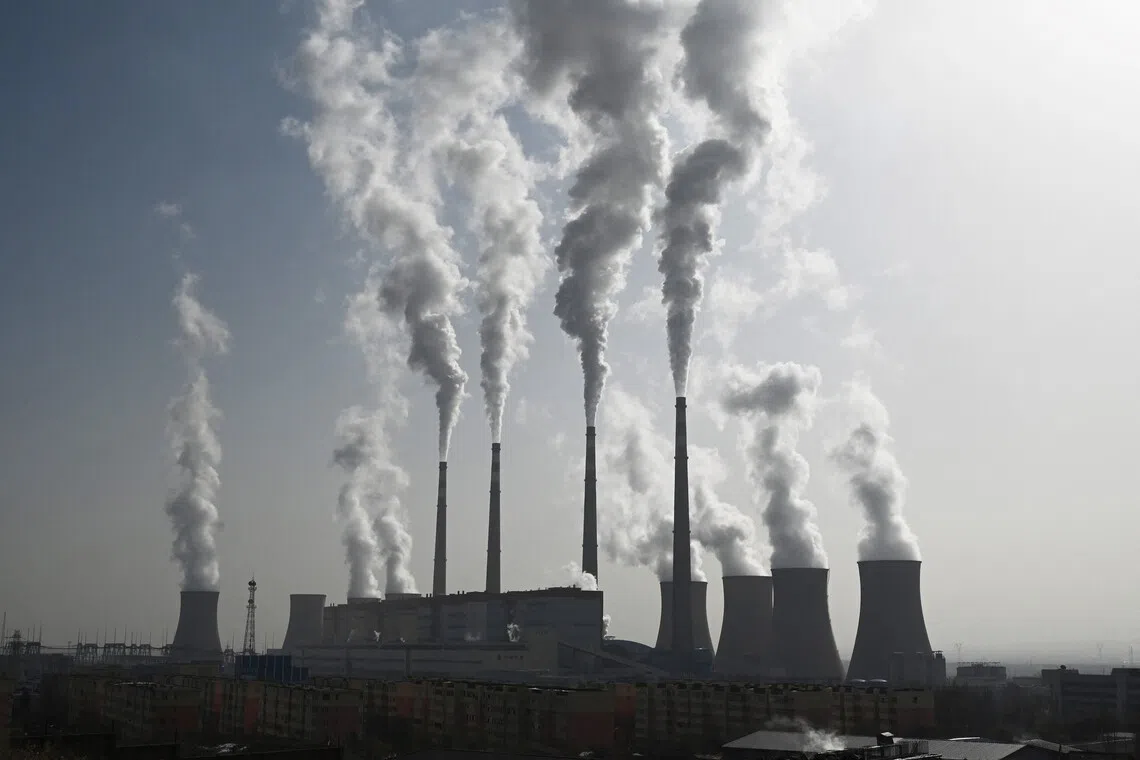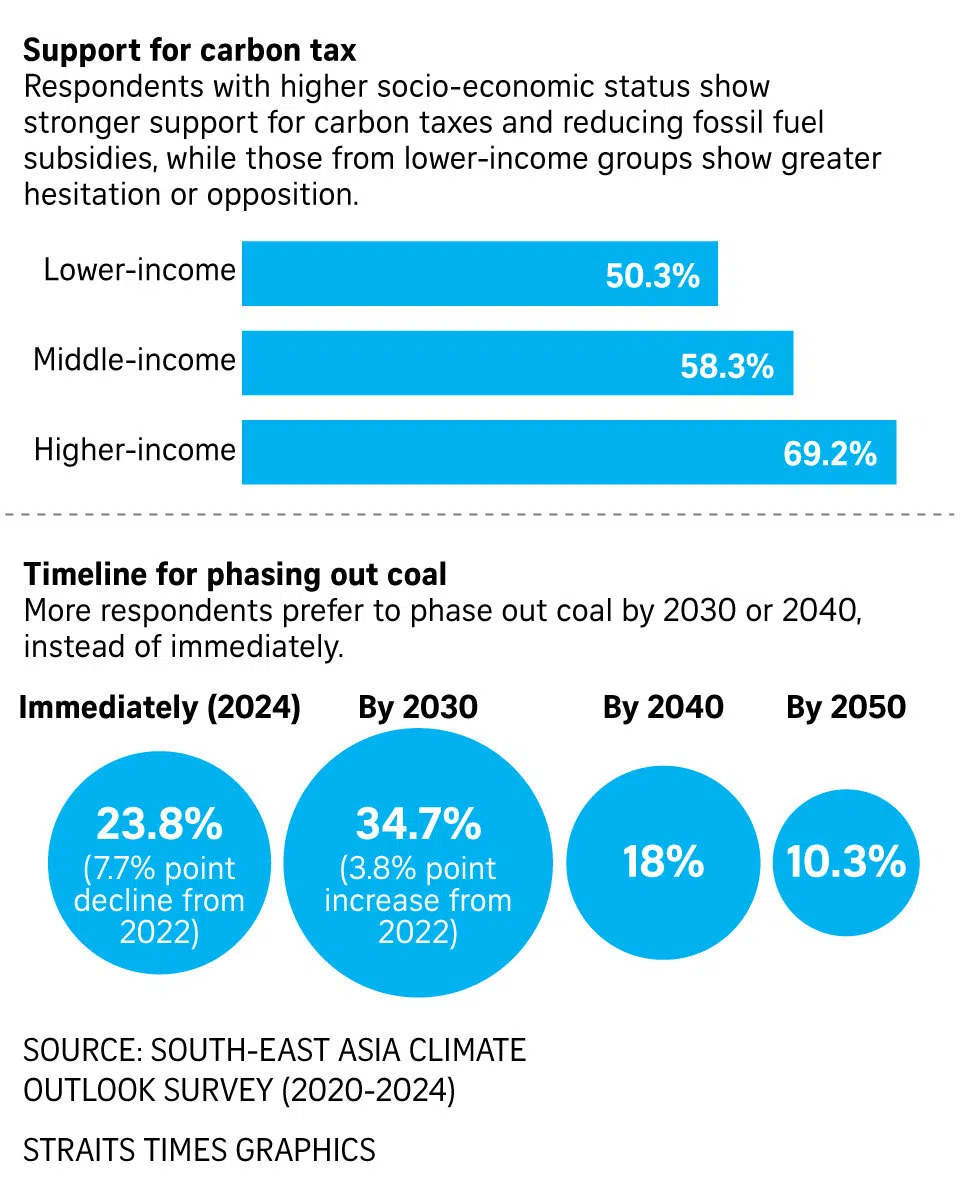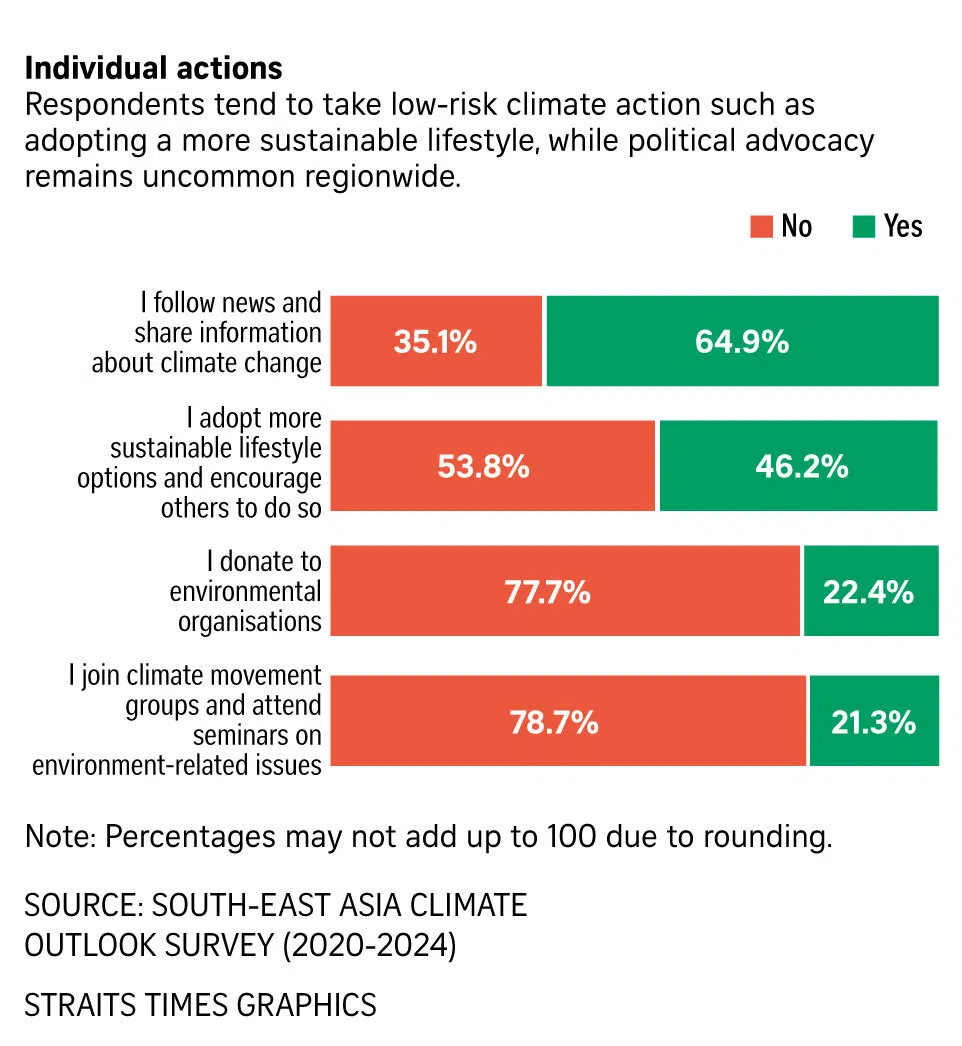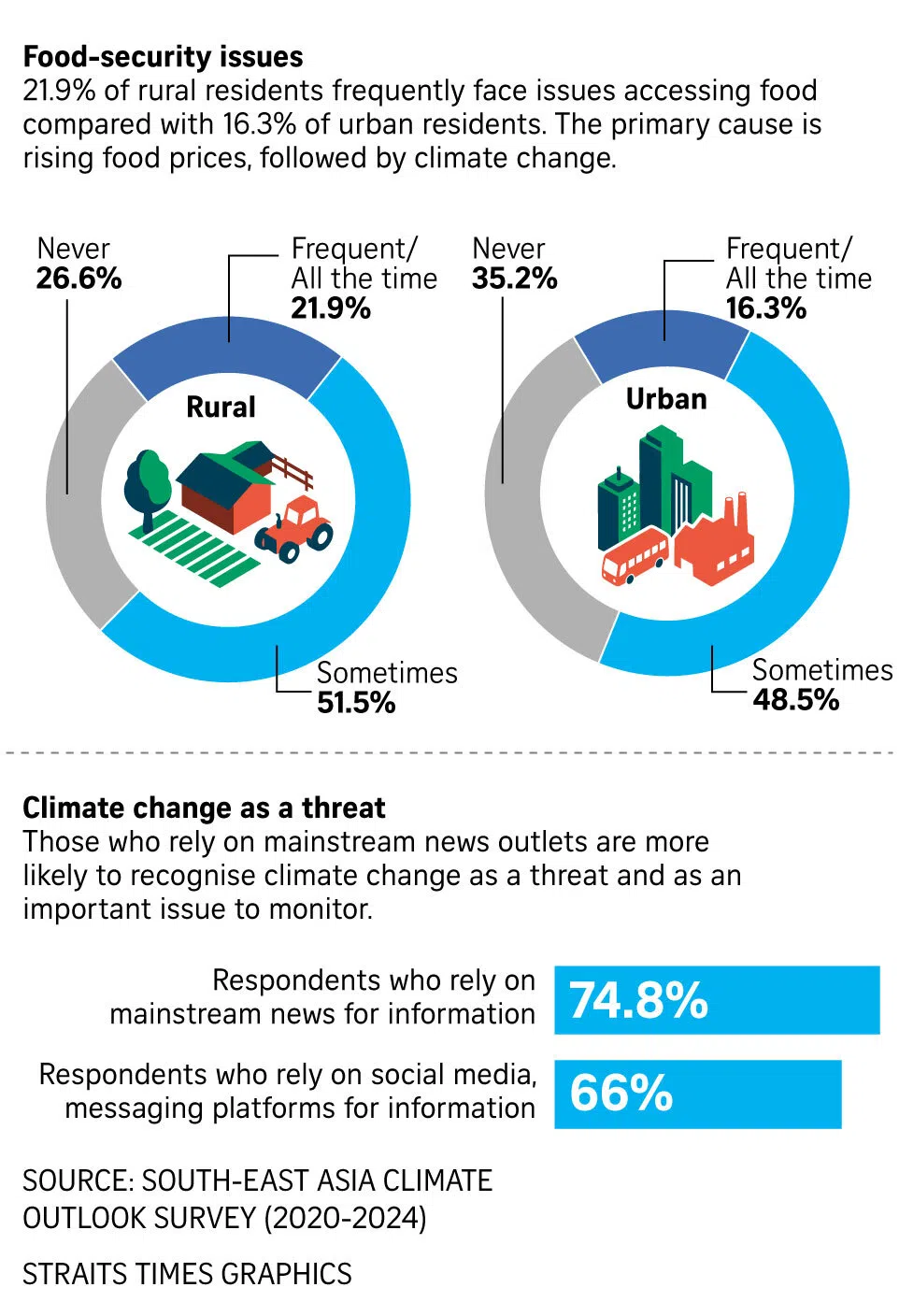Many South-east Asians support climate action, but hesitant about policies that can raise costs
Sign up now: Get ST's newsletters delivered to your inbox

The sentiment to delay the phase-out of coal spanned all 10 countries, even those with low dependence on coal like Singapore and Myanmar.
PHOTO: AFP
Follow topic:
- South-east Asians generally support climate action, but are hesitant about measures raising living costs, like phasing out coal that accounted for 80% of Asean's power emissions in 2023.
- Lower-income groups are more wary of carbon taxes and reduced fossil fuel subsidies due to concerns about higher energy prices, according to a local report.
- Despite cost concerns, people favour lower-risk climate actions like following news (65%), but the report stresses government visibility and regional cooperation that can help with climate goals.
AI generated
SINGAPORE - People in South-east Asia appear generally supportive of climate action, but think that measures that could result in higher costs of living should be pushed back, a new report released on Nov 28 found.
For one, regional support for the immediate phase-out of coal declined steadily between 2022 and 2024. Instead, support for delaying the transition to 2030 and 2040 rose.
Coal is the dirtiest form of fossil fuel, but accounted for 80 per cent
The report by Singapore researchers also found that those from lower income groups in the region were also more hesitant about carbon taxes and the reduction of fossil fuel subsidies in their countries, as they worry about higher energy prices.
These were among the key findings after five years of surveying more than 7,600 respondents across 10 Asean nations that aimed to gauge regional attitudes toward climate change.
These climate mitigation strategies - phasing out coal, removing fossil fuel subsidies and putting a price on carbon - have been globally touted as solutions to reducing the release of planet-warming greenhouse gas emissions.
But the regional sentiment toward these strategies show the trade-offs that will be felt by communities across developing Asean, where many still lack access to electricity, or have other pressing cost-of-living issues weighing on their minds.
The surveys between 2020 and 2024

The report was released at a seminar by the ISEAS-Yusof Ishak Institute on Nov 28, barely a week since the UN climate change conference COP30 concluded on Nov 22 with no commitment from global leaders to phase out fossil fuels.
Rising costs remain a worry among respondents, the survey found, even as climate impacts continue to affect the lives of people in the region, from floods and typhoons to erratic weather affecting food production.
For instance, the survey found that despite being located closer to farms, rural residents experience greater difficulties with access to food compared to urban residents.
More than 21 per cent of rural residents experience food insecurity, compared with 16 per cent of urban residents. The primary cause for this is rising food prices, followed by climate change impacts and limited agricultural investments.
“While respondents appreciate the importance of a near-term phase-out, the entrenched use of coal in the region’s economies, combined with a multitude of domestic and international developments have led to increasing hesitancy for immediate action,” said the report.
The sentiment to delay the phase-out of coal spanned all 10 countries, even those with low dependence on coal like Singapore and Myanmar.
Around 1 per cent of Singapore’s energy comes from coal, while Myanmar relies on it for around 5 per cent of its electricity. But respondents from both countries were the least supportive of phasing out coal in 2022 and 2024, preferring a 2030 timeline instead, the report found.
In 2024, 14 per cent of respondents from Myanmar opted for an immediate phase-out, down from the 20 per cent in 2022. For Singapore, the figure dropped from 24 per cent in 2022 to 18 per cent in 2024.
With relatively lower levels of electricity access compared to its neighbours, Myanmar respondents may be more hesitant to advocate for an immediate coal phase-out, the report noted.
As Singapore is a global economic hub, respondents here may be more sensitive to the impact of geopolitics on energy supplies and prices, prompting them to opt for a 2030 phase-out, it added.
Countries highly dependent on coal, such as Cambodia and Vietnam, likewise recorded a sharp drop in support for the immediate phase-out of coal.
The researchers said a potential reason for this was that both countries had to grapple with the unreliability of hydropower - a renewable energy resource - caused by the impact of climate change on water supplies.
In 2023, for example, droughts in Vietnam forced the authorities to temporarily shut down 11 hydropower dams, removing 5,000 megawatts from the power grid, which is enough to power two million homes annually.
Blackouts in Cambodia and Vietnam caused small businesses to suffer losses and citizens sought refuge in shopping malls due to the extreme heat.
The differing impact of climate policies across socioeconomic groups also showed up in the regional response to perceptions of carbon taxes and the reduction of fossil fuel subsidies.
Across the region, nearly 70 per cent of higher-income respondents were willing to accept a carbon tax, compared with around 50 per cent of lower-income folks.
A carbon tax puts a price on greenhouse gases to force polluting firms to slash their emissions. This can affect the ordinary person when a power plant’s additional costs from the tax trickles down to homes’ electricity bills.
From $5 per tonne of emissions in 2019, Singapore’s carbon tax
This will increase further to $45 per tonne in 2026 and 2027. By 2030, the tax rate could be $50 to $80 per tonne.
Transparent communication about the use of tax revenues or reallocated subsidy savings would help gather support for these policies, said the report, stressing that emission reduction policies must take vulnerable groups and cost pressures into account.
Despite cost concerns, the report showed that people were willing to take steps for a greener future. But they preferred to stick to low-risk actions instead of political advocacy or donating to organisations.

Across all 10 countries, the most common action taken by respondents was to follow climate news and share information about climate change, with around 65 per cent of respondents saying they do so.
Some 46 per cent of them said they switched to a more sustainable lifestyle. But only 5.8 per cent of them attend protests and 11.9 per cent lead projects on climate change awareness.
The paper also noted that when the government is seen to act, people do too.
To get more people taking action, policies should be made visible and credible, with easier ways for the public to contribute, said the report.
There is also a need to protect proper civic participation so that citizen action can complement, rather than substitute for, government leadership, the report added.
The report also touched on how South-east Asia can shape its own climate future, given the geopolitical climate that may dampen financial flows from other developed nations.
Specifically, the report highlighted the importance of Asean working with “all partners who are committed and can provide the resources to support the bloc’s climate goals”.
But it should not rely fully on external support, the reported noted, adding that Asean should also set strategic priorities, improve governance and activate resources and improve cooperation within the region while securing the public’s support.
In 2024, Asean residents considered Japan a climate leader. Japan’s long history of providing aid and development assistance to South-east Asia since the end of the Second World War likely contributed to this perception, added the report.

Between 2020 and 2023, Japan channeled more than US$23 billion (S$29 billion) in climate aid to the region, largely through loans. Other countries and economies ranked after Japan as climate leaders are the European Union, the US and China.
But the report also observed that Japan’s position as the bloc’s climate leader may be short-lived, and identified China as a potential frontrunner on this.
For one, Japan’s Official Development Assistance scheme faces fiscal pressures. The East Asian giant has also pledged new large scale investment in the US economy.
“China is well positioned to expand its influence through its financial initiatives, growing capacity as a clean technology powerhouse, as well as its focus on South-South (regional) cooperation,” added the paper.



